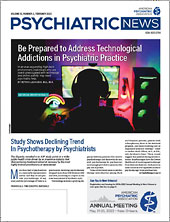U.S. Surgeon General Vivek H. Murthy, M.D., M.B.A., issued a rare public health advisory last December, calling on the nation to respond to the growing mental health crisis impacting young people that has worsened with the pandemic.
“Recent national surveys of young people have shown alarming increases in the prevalence of certain mental health challenges—in 2019, 1 in 3 high school students and half of female students reported persistent feelings of sadness or hopelessness, an overall increase of 40% from 2009,” wrote Murthy in the advisory.
Suicide rates among youth aged 10 to 24 years increased by 57% between 2007 and 2018, and there were more than 6,600 estimated deaths by suicide in 2020 in this age group.
“[T]oo often, young people are bombarded with messages through the media and popular culture that erode their sense of self-worth—telling them they are not good looking enough, popular enough, smart enough, or rich enough,” Murthy wrote. “That comes as progress on legitimate and distressing issues like climate change, income inequality, racial injustice, the opioid epidemic, and gun violence feels too slow.”
Various hypotheses have emerged to explain the youth mental health crisis, with researchers pointing to the growing use of digital media; increasing academic pressure; limited access to mental health care; alcohol and drug use; and broader stressors such as rising income inequality, racism, gun violence, and climate change. The pandemic and its disruptions to life at home and school and in the community have exacerbated these effects on youth. Tragically, more than 140,000 U.S. children have lost a parent or grandparent caregiver to COVID-19 as of June 2021.
Gabrielle Shapiro, M.D., chair of APA’s Council on Children, Adolescents, and Their Families and a clinical professor of psychiatry at the Icahn School of Medicine at Mount Sinai, said that the integration of social and emotional development into the school curriculum has helped make today’s children and adolescents much more likely than adults to discuss their depression, anxiety, and suicidality and to seek help for it. “We are slowly melting the stigma of mental illness, particularly with the younger generation, and that’s a good thing. However, the increases in depression and suicidality among young people should serve as a wake-up call to all of us,” she added.
“The level of societal anxiety, conflict, and rage that we have had for the last six years has been much higher than usual, and this has spilled down onto our kids, who’ve had nearly constant interaction with it on social media. During the pandemic, children have been isolated from their peers and stuck at home, bereft of any structure that is comforting for them. This amplified any existing problems in the family dynamic, such as dysfunction or conflict. At the same time, families experienced serious financial concerns, food insecurity, housing concerns, and fear of death from COVID-19.”
Shapiro said that more child and adolescent psychiatrists are needed to ensure that youth with mental health challenges receive the treatment they need. She called for increased government support for those training to become child and adolescent psychiatrists, including tuition assistance and loan reimbursement, as well as more avenues to train these clinicians to lead mental health teams.
Murthy wrote that most importantly, the mental health challenges of youth are treatable and often preventable. “Ensuring healthy children and families will take an all-of-society effort, including policy, institutional, and individual changes in how we view and prioritize mental health,” Murthy wrote. The advisory provides recommendations for health care professionals and organizations, young people and their families, technology and media companies, schools and community organizations, and government.
Shapiro also said that “schools should continue to employ a social and emotional development curriculum for all students, and because of the shortage of mental health professionals, offer group therapy—for students who are deemed stable and not acutely dangerous to themselves or others—with licensed providers who are supervised by child and adolescent psychiatrists.” In addition, Shapiro advised parents to supervise their children’s use of technology and social media and place limits on the type and duration of use, depending on their developmental stage.
The surgeon general’s advisory gives the following recommendations for physicians and other health care professionals and organizations:
•
Implement trauma-informed care principles and prevention strategies to improve care for all youth, especially those with a history of adversity.
•
Routinely screen children, such as during well-visit appointments, for mental health challenges and risk factors, including adverse childhood experiences.
•
Identify and address the mental health needs of parents, caregivers, and other family members.
•
Combine the efforts of clinical staff with those of trusted community partners and child-serving systems, such as those in the child welfare system.
•
Build multidisciplinary teams to implement services that are tailored to the needs of children and their families and provide culturally appropriate services in multiple languages and delivered by a diverse mental health workforce. ■
“Protecting Youth Mental Health: The U.S. Surgeon General’s Advisory” is posted
here.


